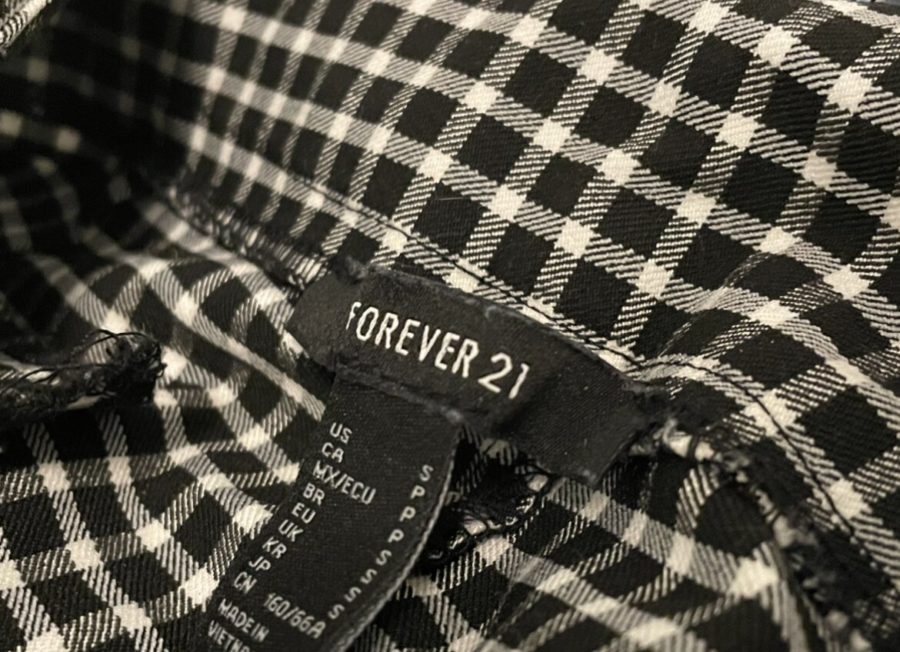Editorial: Fast fashion effects hurt
Writer gives facts, stats to encourage consumers to shop ethically
Alyssa Clark
Picking out her outfit, executive opinion editor and senior Alyssa Clark looks at a skirt she bought from Forever 21. Forever 21 is along the many online and real stores that mass-produce clothing, like ROMWE or H&M. “Customers are not purposefully harmful for buying from websites like SHEIN — they’ve been blindsided,” Clark said. “Society needs clothes, and the pressure of social media and classmates’ outfits causes students to feel pressured to wear a certain, trendy style.
September 15, 2021
Fast fashion, a term used to describe trendy clothes sold at cheap prices with mediocre quality, plagues the fashion industry. Some of the most popular “fast fashion” brands are well-known, like SHEIN and ROMWE. But some of these brands have been disguised by the facade of shopping malls, and stores like H&M, Zara or Forever 21 have been able to slide under the eye of judgement for too long.
Fast fashion can kill the environment, hurt people’s livelihoods and will continue to destroy the integrity of the fashion industry.
The simple click of a button to buy a full cart on popular sites such as SHEIN may not hurt a checking account, but the effect on the environment is becoming detrimental. According to a New York Times article from 2019, more than 60% of fabric fibers are now synthetics derived from fossil fuels, sp one day, when our clothing ends up in a landfill, it will not decay. About 85% of textile waste in the country goes to landfills, or is incinerated.
The 2021 Fashion Transparency Index shows that SHEIN placed in the 0-5% category when compared to many other recognizable names in five different areas, including policy & commitments, governance, traceability, know, show & fix and spotlight issues. They placed in the 0-5% as a final score.
The Fashion Transparency Index highlights the integrity and impact of fashion companies on the environment, consumers and treatment of employees. While none of the brands scored above 80%, transparency with fashion is important for consumers to see how their favorite brands score, and to hold them accountable by choosing to buy at companies with higher scores, or find more clothing from hand-me-downs, thrift stores and environmentally-friendly brands.
Fast fashion industries have been able to hide in the dark, and in doing so, are ruining the trust-worthiness and ethical standings of the fashion world for consumers. The creation of mass-made clothing causes companies to resort to cheap, mediocre materials, which fall apart soon after it’s bought. When clothes fall apart, they end up in a landfill. The more cheap clothes that are bought to replace these garments leads to this cycle never ending. The importance of donating, thrifting or paying extra for better quality clothes has a greater effect than most people know.
Not only is the effect of these mass-manufactured clothes harmful for the planet, but it’s hurting the lives of the millions of people stuck working in horrible working environments and suffering unfair wages. According to Sustain Your Style, the average garment worker works 96 hours in a week, and in most manufacturing countries, the minimum wage for these workers comes out to about half, or even as low as a fifth of the living wage needed in their country. A living wage is the bare minimum pay that a person or family needs to continue living with dignity, including food, clean water and shelter.
Customers are not purposefully harmful for buying from websites like SHEIN — they’ve been blindsided. Society needs clothes, and the pressure of social media and classmates’ outfits causes students to feel pressured to wear a certain, trendy style. These styles are promoted by popular stores like Forever 21 or Zara, so consumers, specifically teenagers, can’t afford to buy high-priced clothing.
But, not all hope is lost. Some clothing companies like CHNGE use 100% organic material with powerful messages, involving social injustice and effects on the earth. The use of 100% organic material helps stop the spread of micro-plastics in the ocean, and reduces the pollution created from synthetic materials. Another popular trend that’s began to take effect is slow fashion, a form of fashion that considers all aspects in respect to people, animals and the environment. Slow fashion highlights new trends without the detrimental effect on garment workers and our planet, and pays respects to everyone regardless of age, gender and figure.
The future of fashion lies on the back of major corporations. In order to make big change, there needs to be big decisions made. Consumers can influence these choices by choosing to buy from organic brands or thrifted stores. Transparency and clarity are key, and are important factors in choosing clothing, so before freaking out about the price tag of a 100% organic cotton tee, think about the price that the environment pays with every click on fast fashion websites.
This story was originally published on Eagle Nation Online on August 25, 2021.




































